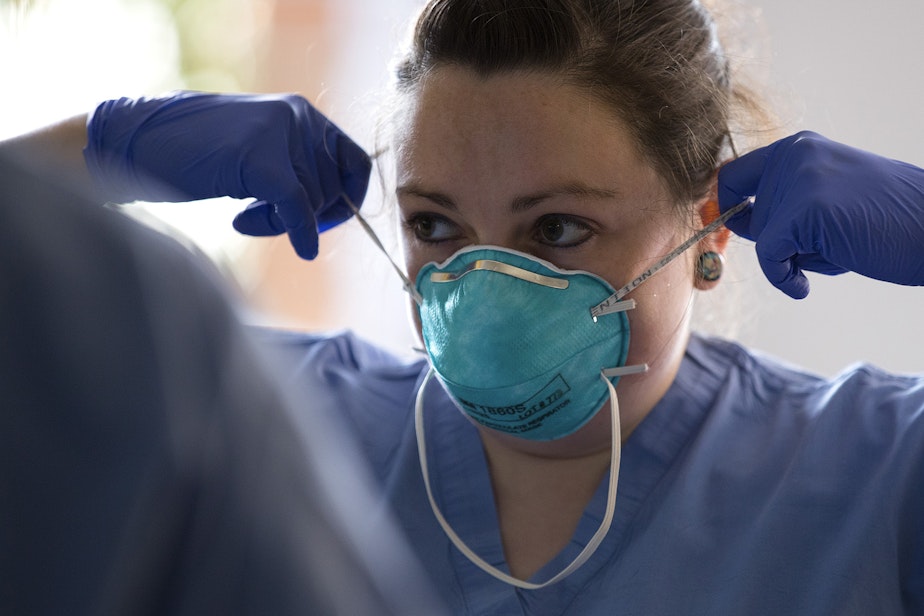UW, other hospitals in Washington state relax masking policies

As Covid-19 hospitalizations and deaths in Washington state continue to trend downward, multiple health care organizations are rethinking their masking policies.
That includes University of Washington medical sites.
As of Monday, masking is no longer universally required in UW medicine health care facilities.
This means many patients, visitors, and staff will now make a personal choice about whether to mask in UW hospitals and clinics, with some notable exceptions.
Health care workers are required to wear masks in high-risk areas, like the Emergency Department, and when treating high risk patients, such as those receiving cancer treatments or organ donations.
Visitors in these areas are also expected to wear masks, as are patients if they’re able. Health care workers are also required to mask if requested by a patient, or if their patient is masked.
Patients with symptoms of a viral respiratory illness — like flu, Covid-19, or RSV — are required to mask if able, as are health care workers caring for them.
“While masking is no longer required in all clinical spaces, it is still strongly encouraged, especially during patient-facing encounters. Please note that without a mask, health care workers may be placing themselves at greater risk of exposure to Covid-19 and other respiratory viruses in the workplace,” said an email sent to UW medicine staff last week.
Sponsored
The new policy leaves room for individuals to make their own choices in many situations.
However, it also leaves room for individual clinics and units to continue to require masking in their particular area if they choose. It’s unclear at this point how many clinics will choose to do this.
UW is not alone in relaxing its stance on masking.
The state’s universal masking mandate for health care settings and correctional facilities expired in April.
Following the expiration, a cohort of health care institutions in the Puget Sound region, including UW medicine, signed on to a consensus statement committing to continue requiring masks in their facilities for several months.
Sponsored
Now, many of those institutions are rethinking their rules.
As of late June, MultiCare Health System now only requires masking in high-risk areas, like intensive care units (ICUs). Masking in all other areas is strongly encouraged but not mandated.
Kaiser Permanente adopted a similar policy in early June.
According to the Northwest Healthcare Response Network, policies differ from institution to institution, but there appears to be an overall shift away from the requirement of universal masking, at least in some spaces within hospitals and clinics.
In long-term care facilities, masking practices are determined by individual company policies, as well as Covid-19 rates within the community, and whether the facility is experiencing an outbreak.
Sponsored
According to the Washington Health Care Association, for the most part, residents and families are pleased to see staff’s faces after such a long period of masking.
Most correctional facilities ended universal masking back in April when the state mandate ended.
The current shift among local hospitals doesn’t mean masking is a thing of the past for patients and health care workers.
As virus season approaches once again in the fall, many health care institutions will likely revisit their policies and may once again tighten rules around face coverings, especially if cases of Covid-19 and other viruses begin to rise.
While Covid-19 deaths and hospitalizations in Washington state have hit some of their lowest levels since the pandemic began in recent months, the virus continues to circulate.
Sponsored
Public health officials recommend that people in health care settings continue to mask.
“We are concerned that outbreaks may become more frequent if masking practices within health care settings become less consistent,” said Dr. Eric Chow, Chief of Communicable Disease for Public Health – Seattle & King County, in a statement.
This concern is shared by some community members who worry that reduced masking will make health care settings less safe for those at highest risk.




